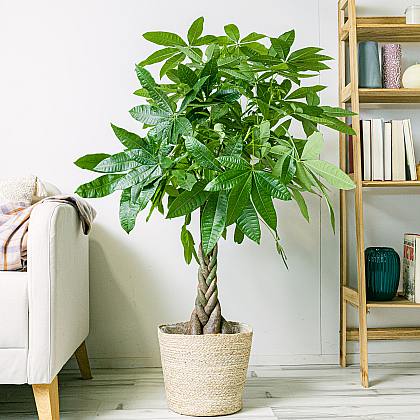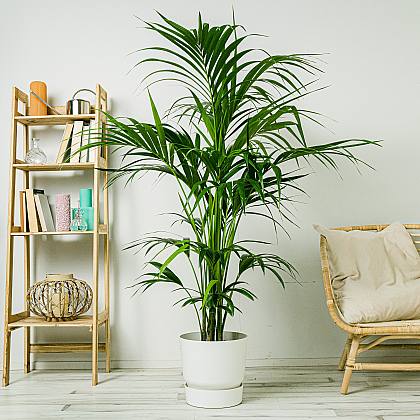Give the gift of nature in miniature: bonsai to surprise
Bonsai trees are a unique and beautiful way to decorate our homes and gardens. These little wonders of nature allow us to enjoy the beauty and charm of miniature trees, and give us a therapeutic and relaxing experience when growing them
Bonsai trees are a unique and beautiful way to decorate our homes and gardens. These little wonders of nature allow us to enjoy the beauty and charm of miniature trees, and give us a therapeutic and relaxing experience when growing them. In this article we will explore what bonsai are, their origins and meaning, how to grow them and design a bonsai garden, tips for caring for them and keeping them healthy, and how to give them as an original and lasting gift for our loved ones. Prepare to be amazed by the miniature natural beauty of bonsai.
What are Bonsai?
Bonsai trees are miniature trees that are grown and cared for to keep their size small. Originating in China, bonsai are considered an art form and represent natural beauty in miniature. The word "bonsai" comes from Japanese and means "potted tree." These trees are grown using special pruning and wiring techniques to control their growth and shape. Bonsai trees are characterized by their ancient appearance and twisted trunks, which gives them a unique and fascinating appearance. In addition to being an artistic expression, bonsai also have a deep cultural and spiritual significance. It is believed that growing and caring for a bonsai requires patience and discipline, teaching people to connect with nature and find harmony in their environment. Bonsai can be grown both indoors and outdoors, making them a versatile option for decorating different spaces. These small trees can suit any personal taste, whether you prefer a classic, elegant style or a more modern and minimalist one. In short, bonsai are a wonderful manifestation of miniature natural beauty, which captivates those who are looking for a unique experience of connection with nature.
Origins and Meaning of Bonsai
Bonsai trees are miniature trees that have their origins in ancient China, where they began to be cultivated more than a thousand years ago. However, it was in Japan that this practice was perfected and became a revered art. The term "bonsai" comes from Japanese and means "tree planted on a tray." The Japanese consider bonsai to be symbols of harmony, balance, and serenity, as they represent the beauty of nature in a small space. For them, the care and contemplation of a bonsai are meditative practices that help connect with the essence of life. Bonsai also have a deep cultural and spiritual significance. They are considered objects of good luck and are believed to bring fortune and prosperity to the home. In addition, each style and shape of bonsai has its own symbolism. For example, bonsai trees with twisted shapes represent resilience in the face of adversity, while trees with outstretched branches symbolize generosity and abundance. In short, bonsai are not only small living works of art, but also objects loaded with meaning and cultural symbolism, making them unique and special gifts to surprise our loved ones.
Growing a Bonsai: A Therapeutic and Relaxing Experience
Growing a bonsai can be a therapeutic and relaxing experience for many people. Caring for these small plants requires patience and attention, which can help reduce stress and anxiety. Additionally, working on a bonsai project can be a very rewarding activity, as you can see how the plant grows and takes shape over time. The process of growing a bonsai can also encourage creativity and focus, as each tree requires unique design and care. For some, bonsai cultivation can even become a form of meditation, as they focus on the present moment and disconnect from the outside world while working on their project. In addition, the benefits are not only mental, but also physical. When caring for a bonsai, you are working with your hands and moving your body, which can help relieve muscle tension and improve coordination. In summary, growing a bonsai is an enriching activity that can have multiple mental and physical health benefits.
Bonsai for Every Space and Personal Taste
Bonsai are a perfect choice to decorate any space, whether indoors or outdoors. The versatility of these miniature trees allows them to adapt to different environments and personal tastes. If you have a small space, such as an apartment or office, you can opt for small bonsai, such as ficus retusa or junipero chinensis. These species are ideal for limited spaces, as they can be kept in small pots and their growth is slower. On the other hand, if you have a large garden, you can choose larger bonsai, such as Japanese white pine or Japanese maple. These species will add a touch of elegance and serenity to your garden, creating a unique and harmonious environment. In addition to size, you can also select bonsai according to your personal tastes. If you love flowering, you can opt for species such as cherry blossom or azalea. These bonsai will amaze with their beautiful flowers and fill your space with vibrant colors. On the other hand, if you prefer a more minimalist style, you can choose species such as Japanese black pine or olive tree. These bonsai stand out for their simple and elegant structure, providing a sense of calm and serenity. In short, bonsai offer a wide variety of options to suit every space and personal taste, allowing you to create a unique environment full of miniature natural beauty.
The Art of Bonsai Garden Design
Designing a bonsai garden is an art that requires patience and skill. First of all, it is important to select the right trees for the available space and desired aesthetics. It is advisable to choose trees of different sizes, shapes, and colors to create a harmonious and balanced composition. Also, the location of the garden should be taken into account, as bonsai need direct sunlight but should not be exposed to drafts or extreme temperatures. Once the trees have been selected, they are placed in the garden. It is advisable to use different height levels and group the bonsai strategically to create depth and movement in the design. decorative elements such as stones, fountains or statues can also be included to enhance the beauty of the garden. It is important to remember that the design of a bonsai garden is not static and can evolve over time as the trees grow and develop. Therefore, you need to be willing to make adjustments and changes as needed to maintain the desired aesthetic. In short, the art of designing a bonsai garden is an exciting and rewarding practice that requires dedication and creativity to achieve an impressive result.
Tips for Taking Care of Your Bonsai and Keeping It Healthy
To take care of your bonsai and keep it healthy, it's important to pay attention to a few key aspects. First of all, it is essential to water it properly. Bonsai trees require regular and consistent watering, but they should not be too wet or dry. Ideally, they should be watered whenever the surface of the substrate is dry to the touch. It is also important to use water without chlorine or salts, as these components can damage the bonsai roots.
Another aspect to consider is pruning. regular pruning helps maintain the shape and size of the bonsai, as well as stimulate its growth. It is important to use clean, sharp cutting tools to avoid damaging the tree. In addition, it is advisable to remove dead or diseased branches and leaves to prevent them from affecting the health of the bonsai.
Compost is also crucial for maintaining a healthy bonsai. It is important to use a specific bonsai fertilizer and follow the manufacturer's instructions. Fertilizer should be applied during the tree's active growing season, approximately from spring to fall.
Finally, it is important to protect the bonsai from sudden changes in temperature and draughts. Bonsai prefer stable and moderate temperatures, so it is advisable to keep them in a protected and well-ventilated place.
By following these basic tips, you will be able to take care of your bonsai and keep it healthy for a long time. Remember that each species has its own specific needs, so it's important to do your research on the characteristics of your particular tree to ensure you provide it with proper care.
Giving a Bonsai Gift: An Original and Long-Lasting Gift
Giving a Bonsai Gift: An Original and Long-Lasting Gift
Gifting a bonsai can be a unique and long-lasting option to surprise your loved ones. These small miniature trees are not only beautiful, but also represent a connection to nature and a symbol of peace and harmony. A bonsai is an original gift that shows care and dedication, as it requires constant attention to keep it healthy and in good condition.
By gifting a bonsai, you're giving away more than just a plant. You're offering a long-term experience and commitment. The gift recipient will have the opportunity to grow and care for their own tree, which can become a therapeutic and relaxing activity. In addition, bonsai can be a constant reminder of the love and friendship that is shared.
A bonsai can be adapted to different spaces and personal tastes, making it a versatile gift. From small indoor bonsai ideal for apartments or desks, to the larger, more majestic ones suitable for gardens, there are options for all styles and preferences. By choosing the right bonsai for the special someone, you'll be showing how much you care about their happiness and well-being.
In short, giving a bonsai as a gift is an original and long-lasting choice that is sure to surprise your loved ones. This unique gift represents a connection with nature, offers a therapeutic and relaxing experience, adapts to different spaces and personal tastes, and requires constant care. A bonsai is much more than a plant, it is a symbol of love, friendship and long-term commitment.
All in all, bonsai are a unique way to connect with nature and enjoy the miniature beauty they offer. Through its care and design, we can experience a sense of calm and tranquility, becoming a therapy for daily stress. In addition, giving a bonsai as a gift is an original and lasting way to surprise our loved ones, transmitting a message of care and love for nature. However, beyond their aesthetic appearance, bonsai invite us to reflect on our relationship with the natural environment and how we can learn to care for and preserve it. So the next time you see a bonsai, take a moment to admire it and contemplate the miniature beauty it holds, but also to reflect on our role as stewards of the environment


